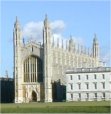
News
Registration
Travel to Cambridge
About Cambridge
Arrival information
Accommodation
Network connection
Organisation
Programme
Speakers
Transparencies/audio
Call for Papers
IFIP WG11.3 Home
IFIP TC11 Home
IFIP WG 11.3 Conference, 2002
Cambridge and its collegesThe 2002 conference will take place in King's College, one of the older colleges among those that form the University of Cambridge. Both the University and the City of Cambridge have a long history, and there is a lot to see. There are no sessions on Tuesday afternoon. That affords an opportunity to see some of the sights, including the college chapel, a triumph of English Perpendicular architecture. The chapel contains one of the world's greatest fan vaults. But there is a lot more to Cambridge than you can see in a single afternoon, and you may wish to stay longer and see a bit more (or just to use the time forced on you by airline pricing policy in a profitable way). This page contains a few pointers in case you wish to learn a bit about Cambridge in advance. The main purposes of the University are teaching and research, but inevitably these activities create resources of general interest, for example the Botanic Garden and the Fitzwilliam Museum.
The University of CambridgeThe university runs the undergraduate courses and the research programmes for which Cambridge is known worldwide. Courses are administered by faculties; lectures are given by individual academics who are appointed to departments (such as the Computer Laboratory) to undertake teaching and research. Student assessment is based primarily on Tripos examinations that each student takes every year at the start of June. After 3 years (in a few cases, 4 years) the student will qualify for an Honours Degree (BA, Bachelor of Arts, even in the case of those reading Computer Science!). For more information about the structure of the University and the place of the Colleges see The Way it Works.
The Colleges of the UniversityColleges are more than just old and grand halls of residence. Undergraduates wishing to take a Cambridge degree apply to a college rather than to the relevant department, though the latter will often lay down the academic requirements for a particular course. Once admitted the student's steps will be guided by a Director of Studies appointed by the college, who will suggest which university lectures the student should attend. In addition students will go to supervisions ("tutorials"at Oxford) for about two hours each week, usually in pairs. The Director of Studies will arrange supervision on a college basis, at least during a student's first two years. The supervisor may be a Fellow (usually a lecturer who has a specific teaching responsibility in the college), a Fellow of another college appointed on an exchange basis, or a graduate student.In Cambridge, unlike Oxford, appointments to a university lectureship are not connected to a particular college. Even so colleges have strong intellectual traditions and are known for their teaching and research strength in individual subjects. Each college maintains its own Web site, which in many cases describes the history of the college and its buildings.
The City of CambridgeThe University is the dominant employer in Cambridge, a city of about 110,000 people. Next in line comes tourism, and the city council has done its best to present itself online. The pages on leisure and tourism in particular contain too much information to summarise here, mixing simple fact with the occasional hard sell.Some delegates may wish to stay in or around Cambridge for a bit longer than King's can provide accommodation in connection with the conference. The city tourism pages contain a lot of helpful pointers.
|